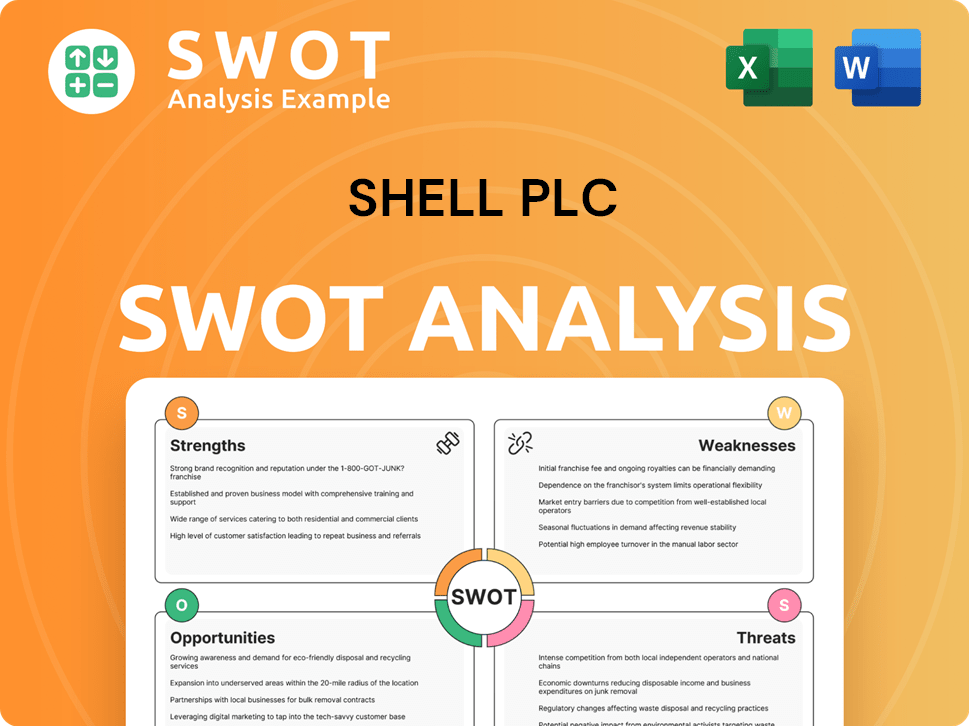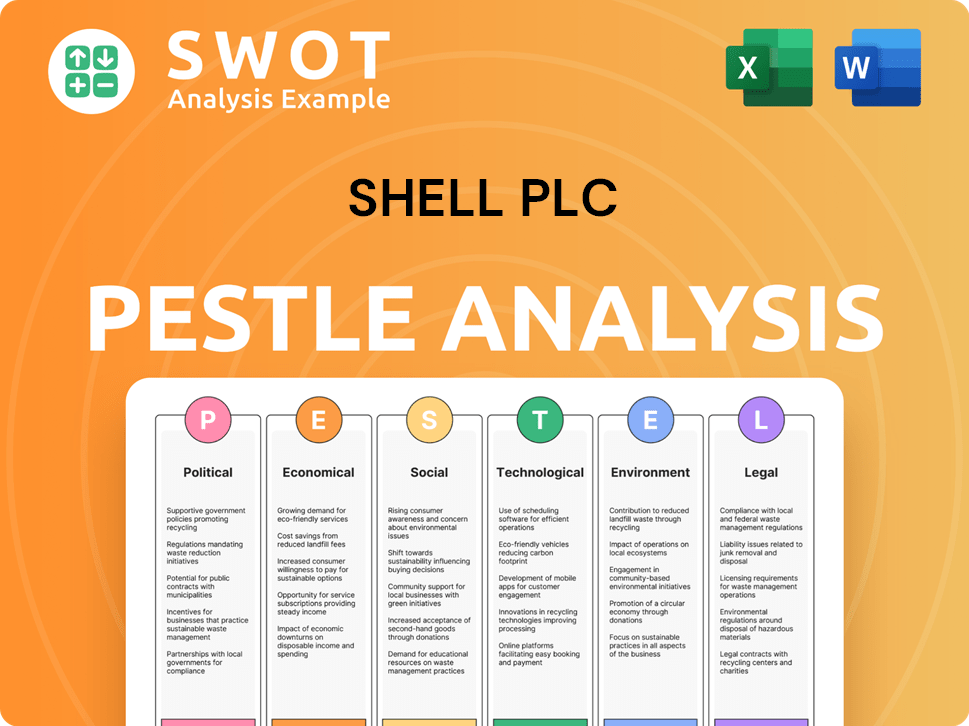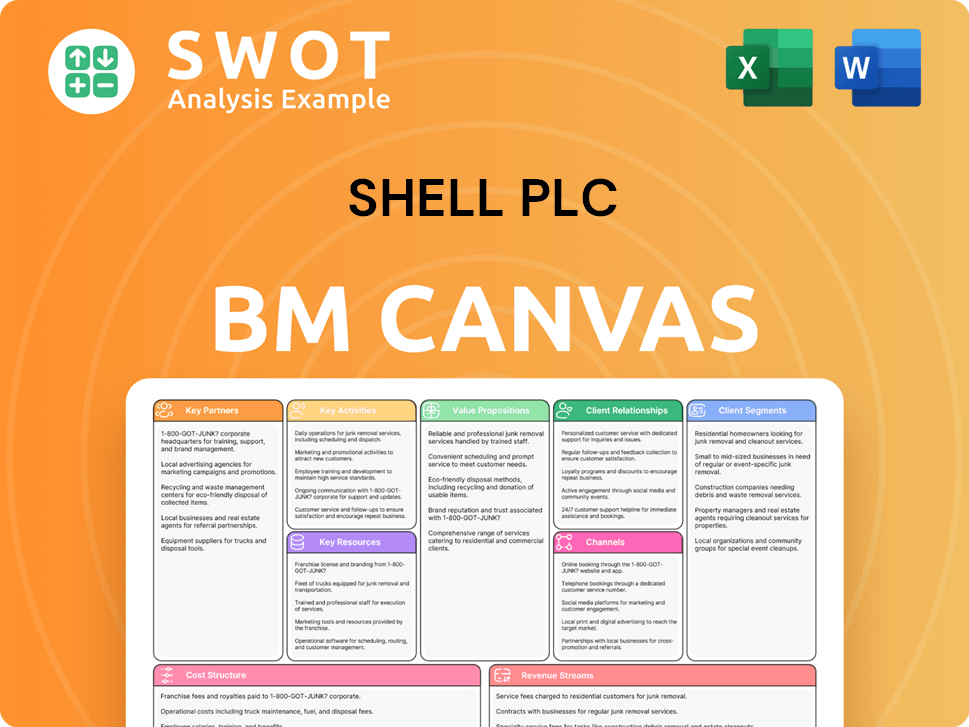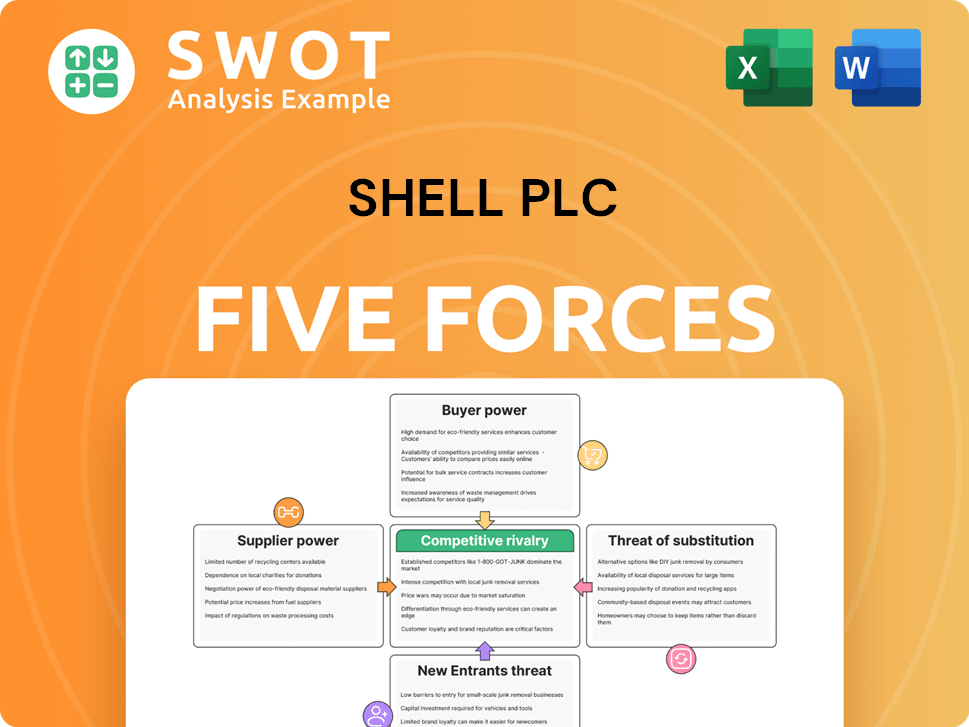Shell Plc Bundle
How Does Shell Plc Navigate the Future of Energy?
Delving into the core of a global energy giant, understanding Shell's Shell Plc SWOT Analysis, mission, vision, and core values is paramount for investors, analysts, and anyone tracking the energy transition. These statements are more than just words; they are the strategic blueprints guiding Shell's investments, operations, and its response to the evolving energy landscape.

Shell's commitment to its mission, vision, and core values offers critical insight into its strategic direction and its role in powering progress while addressing climate change. Examining Shell's mission statement explained, vision for the future of energy, and core values in practice illuminates how the company plans to achieve its long-term goals and navigate the complexities of the energy sector. Understanding these elements is key to grasping Shell's commitment to sustainability and its overall business strategy.
Key Takeaways
- Shell's mission balances energy provision with cleaner solutions, reflecting the energy transition.
- The vision to be the "world's leading integrated energy company" guides Shell's strategic direction.
- Core values (honesty, integrity, respect, safety, environment, growth) shape Shell's identity and actions.
- Shell's investments in low-carbon solutions demonstrate commitment to its core values and mission.
- Corporate purpose is critical for driving strategy and long-term value in the evolving energy sector.
Mission: What is Shell Plc Mission Statement?
Shell's mission is 'to power progress together by providing more and cleaner energy solutions'.
Let's delve into the intricacies of the Shell Mission statement.
The Shell Mission underscores a dual commitment. It aims to meet the world's growing energy needs while simultaneously addressing environmental concerns by providing cleaner energy solutions. This reflects a strategic understanding of the evolving energy landscape.
The mission targets a broad scope of customers requiring energy, spanning various sectors and global markets. This inclusive approach is vital for a company like Shell Plc, which operates on a global scale. The company's diverse customer base includes transportation, industrial, and residential sectors.
The products and services offered by Shell Company encompass traditional oil and gas, alongside a growing portfolio of lower-carbon options. This includes biofuels, hydrogen, and renewable electricity. This diversification is crucial for Shell's vision for the future of energy.
The mission emphasizes a collaborative approach, highlighted by the phrase "to power progress together". This suggests a focus on partnerships and working with others to achieve their goals. This is evident in their investments in renewable energy projects and carbon capture technologies.
Shell's mission is oriented towards balancing the provision of reliable energy with the need for environmental responsibility. This indicates a focus on both customer needs and a transition towards a sustainable energy future. This commitment is crucial for long-term success.
In 2023, Shell invested $24 billion in its energy transition strategy. This included significant investments in renewable energy, biofuels, and carbon capture projects. The company aims to reduce its carbon emissions by 50% by 2030 compared to 2016 levels. For more context, consider reading a Brief History of Shell Plc.
Understanding Shell's mission statement explained provides a framework for analyzing its strategic direction and commitment to both current energy demands and a sustainable future. This mission is a cornerstone of Shell's long-term vision and goals.
Shell Plc SWOT Analysis
- Complete SWOT Breakdown
- Fully Customizable
- Editable in Excel & Word
- Professional Formatting
- Investor-Ready Format

Vision: What is Shell Plc Vision Statement?
Shell's vision is 'to be the world's leading integrated energy company'.
Delving into the core of Shell's strategic direction, understanding its vision is paramount. This vision serves as the guiding star for the Shell Plc, illuminating its path in the dynamic energy landscape. It encapsulates the company's aspirations and future-oriented goals, shaping its strategic decisions and operational endeavors. The Shell Vision is not just a statement; it's a commitment to leadership and innovation.
Shell's vision is inherently future-oriented. It's about positioning itself at the forefront of the global energy sector. This involves anticipating future energy demands and proactively developing solutions to meet those needs.
The term "integrated" is crucial. It signifies Shell's ambition to be involved across the entire energy value chain, from production and refining to distribution and retail. This integrated approach allows Shell to optimize operations and capture value at every stage.
Shell's vision implicitly acknowledges the ongoing energy transition. The company aims to be a key player in providing cleaner energy solutions, which is a critical aspect of its long-term strategy. This includes significant investments in renewables and carbon capture technologies.
The scope of Shell's vision is undeniably global. Shell seeks market leadership across its diverse energy businesses worldwide. This global perspective drives the company to adapt to local market conditions and regulatory environments.
While aspirational, Shell's vision is grounded in realistic strategic objectives. Achieving net-zero emissions by 2050, for example, requires substantial investment and innovation. Shell's commitment to these objectives makes the vision appear both bold and attainable.
Shell's strategic objectives support its vision. These include increasing investments in renewables, expanding EV charging infrastructure, and developing carbon capture technologies. These objectives demonstrate a commitment to the vision, making it appear realistic yet bold given the scale of the energy transition required.
To support its vision, Shell has set ambitious targets. For instance, Shell aims to reduce its absolute emissions by 50% by 2030, compared to 2016 levels. Furthermore, Shell is investing heavily in renewable energy sources, with plans to increase its investments in low-carbon energy solutions. In 2023, Shell's capital expenditure on renewable energy and energy solutions was $5.6 billion, representing a significant portion of its overall investment portfolio. The company's commitment to electric vehicle (EV) charging infrastructure is also notable, with a growing network of charging stations globally. These initiatives, along with its focus on carbon capture and storage, showcase Shell's dedication to realizing its vision of becoming a leading integrated energy company. Understanding Growth Strategy of Shell Plc is key to appreciating how the company plans to achieve its vision.
Shell Plc PESTLE Analysis
- Covers All 6 PESTLE Categories
- No Research Needed – Save Hours of Work
- Built by Experts, Trusted by Consultants
- Instant Download, Ready to Use
- 100% Editable, Fully Customizable

Values: What is Shell Plc Core Values Statement?
Understanding Shell's core values is crucial for grasping its approach to business and sustainability. These values guide the company's actions and shape its identity within the energy sector.
Shell emphasizes ethical behavior across all its operations, ensuring compliance with laws and regulations. Their commitment to ethical conduct is evident in their detailed sustainability reports and commitment to human rights. In 2024, Shell's commitment was further demonstrated through its disclosure of payments to governments and its ongoing efforts to promote ethical behavior among employees and partners.
Prioritizing the safety and health of employees and communities is a key value for Shell. This commitment is reflected in their operational practices and safety protocols. Shell reported a 15% reduction in safety incidents in 2024 compared to the previous year, showcasing their dedication to this core value.
Shell is dedicated to reducing its environmental impact and contributing to a more sustainable future. This is demonstrated through investments in renewable energy projects, efforts to reduce greenhouse gas emissions, and the development of cleaner fuels and technologies. Shell aims to significantly reduce its net carbon footprint by 2030 and achieve net-zero emissions by 2050, demonstrating their commitment to their Owners & Shareholders of Shell Plc.
This value is essential for Shell to deliver value to shareholders and invest in a sustainable future. Shell focuses on disciplined capital allocation, operational excellence, and innovation to drive profitable growth while contributing positively to society and the environment. This focus ensures Shell's long-term viability and ability to adapt to the evolving energy landscape.
These core values of Shell, including its commitment to its mission and vision, collectively shape a corporate identity that is responsible, forward-looking, and focused on long-term sustainability. Understanding these values provides a foundation for appreciating how Shell operates within the complex energy sector. Next, explore how the Shell Mission and Vision influence the company's strategic decisions.
How Mission & Vision Influence Shell Plc Business?
Shell's Shell Mission and Shell Vision are not just aspirational statements; they are the guiding principles that shape its strategic direction and investment decisions. These statements directly influence the company's actions, ensuring alignment with its long-term goals and commitments.
The 'Powering Progress' strategy, a cornerstone of Shell Company's approach, is a direct manifestation of its mission to provide energy and its vision for a sustainable future. This strategy focuses on delivering value with reduced emissions, reflecting a commitment to both energy provision and environmental responsibility.
- This strategy is guided by the ambition to become a net-zero emissions energy business by 2050.
- Significant investments in low-carbon energy solutions are a key component.
- Focus on growing integrated gas and LNG business while transitioning to cleaner energy sources.
Between 2023 and 2025, Shell Plc plans to invest $10 billion to $15 billion in low-carbon solutions. In 2024 alone, the company invested $2.4 billion in renewable energy solutions, marking a 20% increase from the previous year. These investments demonstrate a clear commitment to Shell's mission of providing cleaner energy solutions and achieving its net-zero ambitions.
Shell aims for 4-5% annual sales growth in its integrated gas and LNG business through 2030. This growth strategy acknowledges the role of natural gas in the energy transition, aligning with the 'providing more energy' aspect of its mission. This approach allows Shell to meet current energy demands while simultaneously investing in future energy solutions.
Shell is actively expanding its electric vehicle (EV) charging infrastructure, targeting over 500,000 charging points globally by 2025. Simultaneously, it is developing biofuels. These initiatives support the 'cleaner energy solutions' and net-zero ambitions outlined in its vision. These investments highlight Shell's commitment to a diversified energy portfolio.
Shell's progress towards its goals is tracked through key metrics. By the end of 2024, the company aimed for a 30% reduction in Scope 1 and 2 emissions compared to 2016 levels, achieving 60% of its target to halve operational emissions by 2030. Furthermore, the net carbon intensity of energy products sold was reduced by 9.0% compared to 2016 by the end of 2024. These figures demonstrate tangible progress.
CEO Wael Sawan's vision for Shell is to become the world's leading integrated gas and LNG business and the most customer-focused energy marketer and trader, while sustaining a material level of liquids production. This statement underscores the balance between traditional energy sources and the transition to a more sustainable energy future. This balanced approach is crucial for long-term success.
Shell's actions are deeply rooted in its Shell Core Values, which guide its decision-making processes and ensure that its operations align with its mission and vision. These values emphasize integrity, honesty, and respect for people, which are critical for building trust with stakeholders and achieving sustainable growth. These principles are essential for long-term success.
In conclusion, Shell's mission, vision, and core values are the driving forces behind its strategic decisions, influencing its investments, operational strategies, and long-term goals. The company's commitment to transitioning towards cleaner energy solutions while maintaining its existing energy businesses showcases its dedication to a sustainable future. To further understand how Shell generates revenue and structures its business, read more about Revenue Streams & Business Model of Shell Plc. Next, we will delve into the Core Improvements to Company's Mission and Vision.
Shell Plc Business Model Canvas
- Complete 9-Block Business Model Canvas
- Effortlessly Communicate Your Business Strategy
- Investor-Ready BMC Format
- 100% Editable and Customizable
- Clear and Structured Layout

What Are Mission & Vision Improvements?
While Shell's mission and vision statements articulate a commitment to the energy transition, there's room for enhancement to align with evolving market dynamics and stakeholder expectations. These improvements can strengthen Shell's position in a rapidly changing energy landscape, ensuring its long-term relevance and sustainability.
Shell could significantly improve its mission by setting more ambitious near-term absolute emissions reduction targets across all scopes, rather than primarily focusing on net carbon intensity. This would provide greater clarity and demonstrate a stronger commitment to reducing overall emissions, aligning with the growing demands for tangible climate action. For example, according to the IPCC, to limit warming to 1.5°C, global emissions need to be reduced by 45% from 2010 levels by 2030, a benchmark Shell could incorporate.
Integrating social impact and community well-being more prominently within the core mission or a dedicated social value statement could enhance Shell's corporate identity and address increasing societal expectations. This could involve specific commitments to community development, ethical sourcing, and fair labor practices, reflecting a broader commitment to sustainability beyond environmental concerns. This is particularly important as research indicates that consumers increasingly favor companies with strong social responsibility records; a recent study by Cone Communications found that 87% of consumers would purchase a product because a company advocated for an issue they cared about.
Adapting the mission and vision to explicitly address the disruptive potential of emerging technologies like advanced energy storage and decentralized energy systems is crucial. Being more specific about embracing and leading in these areas could position Shell more strongly for the future, showcasing a proactive approach to innovation. The global energy storage market, for instance, is projected to reach $15.4 billion by 2028, highlighting the importance of incorporating these technologies into Shell's forward-looking strategy.
Addressing changing consumer behaviors, such as the increasing preference for renewable energy sources, and clearly outlining how Shell will cater to these shifts in its foundational statements would also be beneficial. This could involve explicitly stating a commitment to providing renewable energy solutions and adapting its business model to meet evolving consumer demands. This proactive approach is vital, especially given the growing consumer demand for sustainable products and services, as explored in detail in the Marketing Strategy of Shell Plc article.
How Does Shell Plc Implement Corporate Strategy?
The effective implementation of a company's mission, vision, and core values is crucial for achieving its strategic objectives and maintaining stakeholder trust. This involves integrating these guiding principles into all aspects of the business, from investment decisions to employee conduct.
Shell's commitment to its Mission, Vision & Core Values of Shell Plc is demonstrated through significant investments and strategic initiatives. These actions aim to transition towards cleaner energy solutions and align with its vision for the future.
- Significant Investment in Low-Carbon Technologies: Shell has allocated a substantial $10-15 billion between 2023 and 2025 for low-carbon technologies.
- Focus Areas: These investments include electric vehicle charging infrastructure, biofuels, renewable power projects, hydrogen production, and carbon capture and storage technologies.
- Holland Hydrogen 1 Project: A prime example is the Holland Hydrogen 1 project in the Netherlands, a large-scale renewable hydrogen plant.
- Energy Transition Strategy Reports: Shell communicates its progress and investments through these reports, detailing its advancements against climate targets.
Leadership plays a pivotal role in reinforcing Shell's mission and vision. CEO Wael Sawan has emphasized the transformation of Shell to become simpler, more resilient, and more competitive.
The restructuring of the Executive Committee to reflect core business areas, including Downstream, Renewables and Energy Solutions, further demonstrates leadership's commitment to the strategy and, by extension, the mission and vision.
Shell communicates its mission and vision to stakeholders through various channels. This includes its Energy Transition Strategy reports and annual reports.
Shell demonstrates alignment between stated values and business practices through several initiatives. This includes safety performance and ethical conduct.
Shell Plc Porter's Five Forces Analysis
- Covers All 5 Competitive Forces in Detail
- Structured for Consultants, Students, and Founders
- 100% Editable in Microsoft Word & Excel
- Instant Digital Download – Use Immediately
- Compatible with Mac & PC – Fully Unlocked

Related Blogs
- What are Mission Vision & Core Values of Shell Plc Company?
- What is Competitive Landscape of Shell Plc Company?
- What is Growth Strategy and Future Prospects of Shell Plc Company?
- How Does Shell Plc Company Work?
- What is Sales and Marketing Strategy of Shell Plc Company?
- Who Owns Shell Plc Company?
- What is Customer Demographics and Target Market of Shell Plc Company?
Disclaimer
All information, articles, and product details provided on this website are for general informational and educational purposes only. We do not claim any ownership over, nor do we intend to infringe upon, any trademarks, copyrights, logos, brand names, or other intellectual property mentioned or depicted on this site. Such intellectual property remains the property of its respective owners, and any references here are made solely for identification or informational purposes, without implying any affiliation, endorsement, or partnership.
We make no representations or warranties, express or implied, regarding the accuracy, completeness, or suitability of any content or products presented. Nothing on this website should be construed as legal, tax, investment, financial, medical, or other professional advice. In addition, no part of this site—including articles or product references—constitutes a solicitation, recommendation, endorsement, advertisement, or offer to buy or sell any securities, franchises, or other financial instruments, particularly in jurisdictions where such activity would be unlawful.
All content is of a general nature and may not address the specific circumstances of any individual or entity. It is not a substitute for professional advice or services. Any actions you take based on the information provided here are strictly at your own risk. You accept full responsibility for any decisions or outcomes arising from your use of this website and agree to release us from any liability in connection with your use of, or reliance upon, the content or products found herein.